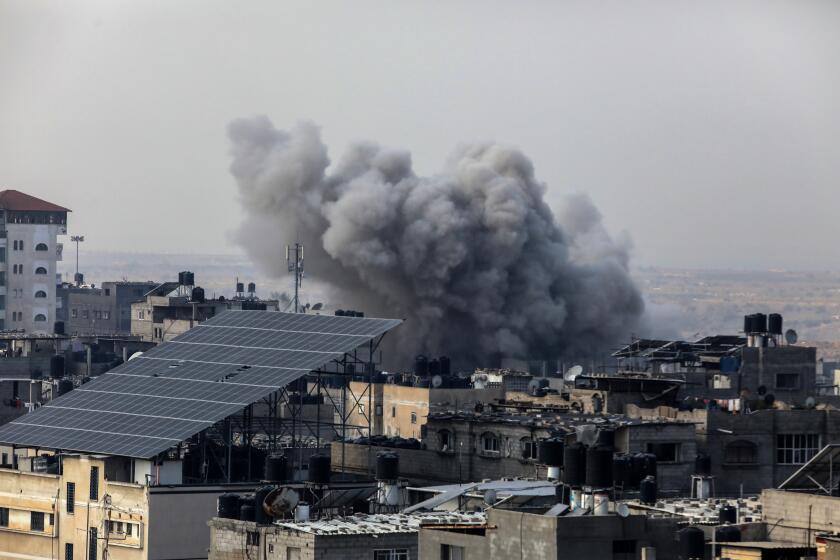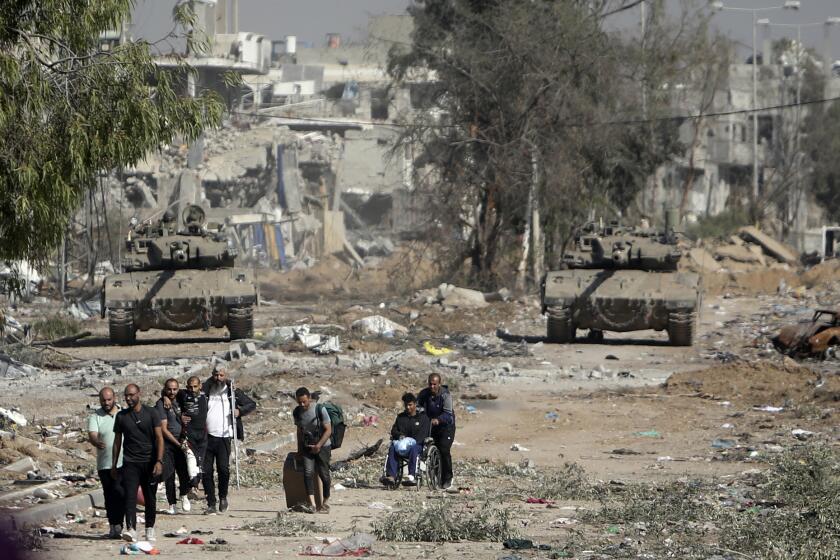Netanyahu’s government is to blame for rift in historic Israel-U.S. alliance

- Share via
Israel has pulled most of its troops from southern Gaza amid talks over the release of the more than 100 hostages held by Hamas since its Oct. 7 attack that killed about 1,200 people. It has also reopened previously closed entry points for food and water to prevent Palestinian civilians from starving after the Israeli military destroyed much of the infrastructure in counterattacks that have killed more than 33,000 in six months of warfare.
These are positive developments but, given the level of death and destruction in Gaza, there is little room for cheer.
The U.S. must use whatever clout it retains in the region to end the madness that has pushed the Palestinian people in Gaza to the brink of famine.
In the wake of the Hamas attack, Israel had the support and sympathy of much of the world. But the unremitting fierceness of its actions in Gaza eroded that goodwill so swiftly and completely that even President Biden has expressed increasing levels of dismay over the actions and attitudes of Israeli Prime Minister Benjamin Netanyahu’s government.
Indiscriminate bombing, Biden said in December, was costing Israel international support.
The U.S. must say ‘no’ to arming and funding Gaza’s destruction, use its muscle to bring Israel to the table, rescue Gaza’s people and stop the slaughter.
Israel’s military response, he said after prepared remarks at a February news conference, were “over the top.”
Biden was particularly critical — appropriately so — of the inability of humanitarian relief workers to get food and water to Gaza’s 2.3 million people, many of whom face famine.
In March, the U.S. for the first time declined to veto a United Nations Security Council resolution calling for a cease-fire, and instead abstained.
The Middle East boils down to a contest between a desire to exterminate the enemy and a desire to live in peace. The U.S. should weigh in on the side of peace.
The situation may have reached a turning point with Israel’s April 1 attack that killed seven aid workers in a World Central Kitchen convoy. They are among the more than 200 aid workers who have been killed in the war.
Speaking with Netanyahu on Thursday, Biden called for measurable steps to, as Secretary of State Antony J. Blinken recounted, “address civilian harm, humanitarian suffering and the safety of aid workers.” The president told the Israeli leader that “U.S. policy with respect to Gaza will be determined by our assessment of Israel’s immediate action on these steps,” according to Blinken.
Israel’s quest to root out Hamas has inflicted indiscriminate death and destruction on Gaza and Palestinian civilians. Humanitarian pauses are no longer enough.
That stops short of demands by some members of Congress to condition continuing U.S. military aid to changes in Israel’s conduct of the war.
But it comes close.
The most positive development now would be for the lull in fighting to lead to hostage releases and a lasting cease-fire. If that’s not to be, though, it will be time for Biden to follow up on his warning to Netanyahu by finally requiring that Israel meet the same standards as other nations that receive U.S. military aid.
When Israel declared war against Hamas, it stood unified at home. Now it is isolated amid global outrage over the rising death toll in the Gaza Strip.
That includes transparency and tracking to ensure that weapons are used “solely for internal security, for legitimate self-defense,” and that the recipient not commit gross violations of human rights.
Calls to hold Israel to these standards were underway well before the current conflict. The Biden administration, like past U.S. administrations, deflected those efforts and continued honoring traditional exceptions for Israel.
Americans are supplying the weapons that enable Israel’s war. In exchange, Israel should show that it is pursuing peace.
Israel’s special status in U.S. arms policy has been justified by the argument that it is a rare democracy in a region of authoritarian and sometimes hostile states, and a close U.S. ally that shares the same values, including support for fundamental human rights (notwithstanding the treatment of Palestinians in the West Bank by Israeli settlers and in Gaza by Israeli policies to seal off the territory).
Now some of the values expressed by the most right-wing government in Israel’s history have caused some Americans to question the relationship. Netanyahu pushed a plan to diminish the judiciary’s ability to hold government power in check. And statements by the prime minister and other members of his government suggest a postwar plan to hold Gaza in perpetual subjection.
The allegations surrounding the war against Hamas should be considered in the context of a long history of similar charges based on scant evidence.
Meanwhile, Israel produces and exports weapons of its own, raising the question of why the U.S. needs to keep supplying arms.
It is Hamas that keeps the war going by continuing to hold the hostages it brutally kidnapped in its October attack.
But it is Israel‘s retaliatory actions in Gaza that may be leading the U.S. to reassess the two nations’ relationship.
More to Read
A cure for the common opinion
Get thought-provoking perspectives with our weekly newsletter.
You may occasionally receive promotional content from the Los Angeles Times.
















